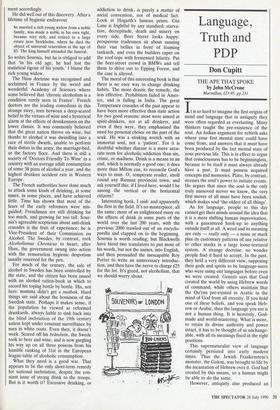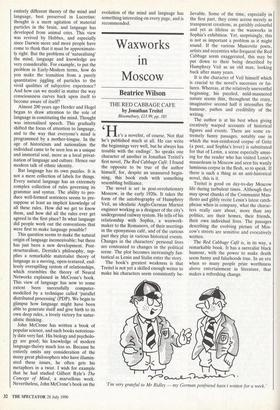Language, Truth and PDP
Don Cupitt
THE APE THAT SPOKE by John McCrone
Macmillan, f13.95, pp.231
It is so hard to imagine the first origins of mind and language that in antiquity they were often regarded as everlasting. Many thinkers taught the pre-existence of the soul. An Indian argument for rebirth asks where your first mental state could have come from, and answers that it must have been produced by the last mental state of your previous life. This is in effect to argue that consciousness has to be beginningless, because to be itself it must always already have a past. It must possess acquired concepts and memories. Plato, by contrast, stresses the soul's power to initiate events. He argues that since the soul is the only truly unmoved mover we know, the very first mover of all must have been soulish, which makes soul 'the oldest of all things'.
As for language, people to this day cannot get their minds around the idea that it is a mere shifting human improvisation, with a guaranteed hook-up to anything outside itself at all. A word and its meaning are only — really only — a noise or mark plus its customary patterns of use relative to other marks in a large loose-textured system. A strange doctrine: no wonder people find it hard to accept. In the past, they held a very different view, supposing their gods and spirits to be language-users who were using our languages before even we were created. Genesis says that God created the world by using Hebrew words of command, while others maintain that the Qu'ran pre-existed in Arabic in the mind of God from all eternity. If you hold one of these beliefs, and you speak Heb- rew or Arabic, then the language you use is not a human thing. It is heavenly, God- made and world-mastering. What is more, to retain its divine authority and power intact, it has to be thought of as unchange- able, with all its meanings fixed in the right positions.
This supernaturalist view of language certainly persisted into early modern times. Thus the Jewish Frankenstein's monster, the Golem, was brought to life by the incantation of Hebrew over it. God had created by this means, so a human might be able to do the same.
However, antiquity also produced an entirely different theory of the mind and language, best preserved in Lucretius: thought is a mere agitation of material particles in the brain, and language has developed from animal cries. This view was revived by Hobbes, and especially since Darwin more and more people have come to think that it must be approximate- ly right. But the problems of 'naturalising' the mind, language and knowledge are very considerable. For example, to put the problem in Early-Modern terms, how do you make the transition from a purely quantitative jiggling of particles to the vivid qualities of subjective experience? And how can we model in matter the way consciousness curves back upon itself to become aware of itself?
Almost 200 years ago Herder and Hegel began to draw attention to the role of language in constituting the mind. Thought was internalised speech. This gradually shifted the focus of attention to language, and to the way that everyone's mind is programmed by a mother-tongue. In the age of historicism and nationalism the individual came to be seen less as a unique and immortal soul, more as a local privat- isation of language and culture. Hence our modern talk of ethnic identity.
But language has its own puzzles. It is not a mere collection of labels for things.
Every natural language has an extremely complex collection of rules governing its grammar and syntax. The ability to pro- duce well-formed sentences seems to pre- suppose at least an implicit knowledge of all these rules. How did we get to know them, and how did all the rules ever get agreed in the first place? In what language did people work out the conventions that were first to make language possible?
This question seems to make the natural origin of language inconceivable; but there has just been a new development. Post- structuralism, Derrida's philosophy, sup- plies a remarkable materialist theory of language as a moving, open-textured, end- lessly overspilling system of relationships, which resembles the theory of Neural Networks explained in McCrone's book.
This view of language has now to some extent been successfully computer- modelled by a technique called 'parallel distributed processing' (PDP). We begin to glimpse how language might have been able to generate itself and give birth to its own deep rules, a lovely victory for natur- alistic thinking.
John McCrone has written a book of popular science, and such books notorious- ly date very fast. His biology and psycholo- gy are good; his knowledge of modern language-theory much less so. Because he entirely omits any consideration of the many great philosophers who have illumin- ated these issues, he often gets his metaphors in a twist. I wish for example
that he had studied Gilbert Ryle's The Concept of Mind, a marvellous work. Nevertheless, John McCrone's book on the
evolution of the mind and language has something interesting on every page, and is recommended.



















































 Previous page
Previous page